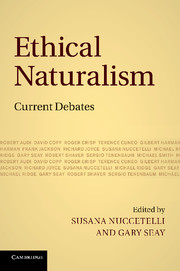Book contents
- Frontmatter
- Contents
- Contributors
- Introduction
- Chapter 1 Naturalism in moral philosophy
- Chapter 2 Normativity and reasons: five arguments from Parfit against normative naturalism
- Chapter 3 Naturalism: feel the width
- Chapter 4 On ethical naturalism and the philosophy of language
- Chapter 5 Metaethical pluralism: how both moral naturalism and moral skepticism may be permissible positions
- Chapter 6 Moral naturalism and categorical reasons
- Chapter 7 Does analytical moral naturalism rest on a mistake?
- Chapter 8 Supervenience and the nature of normativity
- Chapter 9 Can normativity be naturalized?
- Chapter 10 Ethical non-naturalism and experimental philosophy
- Chapter 11 Externalism, motivation, and moral knowledge
- Chapter 12 Naturalism, absolutism, relativism
- Bibliography
- Index
Chapter 8 - Supervenience and the nature of normativity
Published online by Cambridge University Press: 05 January 2012
- Frontmatter
- Contents
- Contributors
- Introduction
- Chapter 1 Naturalism in moral philosophy
- Chapter 2 Normativity and reasons: five arguments from Parfit against normative naturalism
- Chapter 3 Naturalism: feel the width
- Chapter 4 On ethical naturalism and the philosophy of language
- Chapter 5 Metaethical pluralism: how both moral naturalism and moral skepticism may be permissible positions
- Chapter 6 Moral naturalism and categorical reasons
- Chapter 7 Does analytical moral naturalism rest on a mistake?
- Chapter 8 Supervenience and the nature of normativity
- Chapter 9 Can normativity be naturalized?
- Chapter 10 Ethical non-naturalism and experimental philosophy
- Chapter 11 Externalism, motivation, and moral knowledge
- Chapter 12 Naturalism, absolutism, relativism
- Bibliography
- Index
Summary
Necessarily, no two situations can differ normatively without differing in some of their descriptive or non-normative properties. Properly understood, this so-called “supervenience” thesis is extremely plausible, perhaps even a priori true. A longstanding challenge for so-called “non-naturalist” theories of the meanings of normative predicates is to explain supervenience. Non-naturalist theories hold that normative predicates refer to irreducible non-natural normative properties. The worry is that non-naturalism threatens to make supervenience mysterious. For why should one set of properties (the normative ones), which are utterly irreducible to some other set of properties (the descriptive and non-normative ones), necessarily supervene in this way?
In this paper, I begin by sharpening this challenge. In particular, I suggest that the problem is not so much explaining why supervenience is true, but explaining how there could be any non-natural normative properties, given supervenience. I explore this challenge in the context of Ralph Wedgwood’s recent and sophisticated defense of his own novel form of non-naturalism. Although Wedgwood engages more directly with this challenge, and with more acuity and sophistication than most non-naturalists to date, I argue that his approach ultimately is implausible. Non-naturalists still cannot plausibly explain supervenience.
Keywords
- Type
- Chapter
- Information
- Ethical NaturalismCurrent Debates, pp. 144 - 168Publisher: Cambridge University PressPrint publication year: 2011

